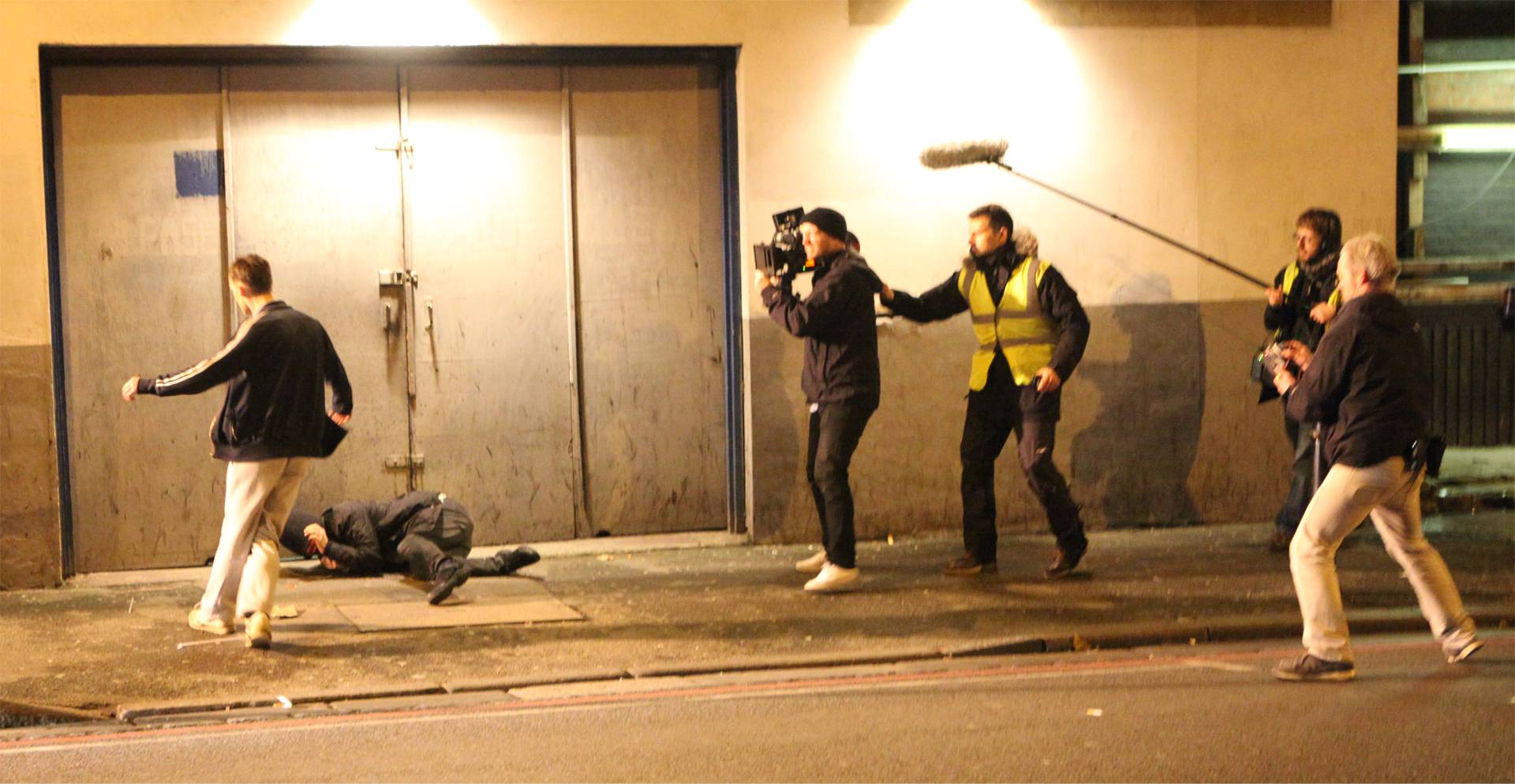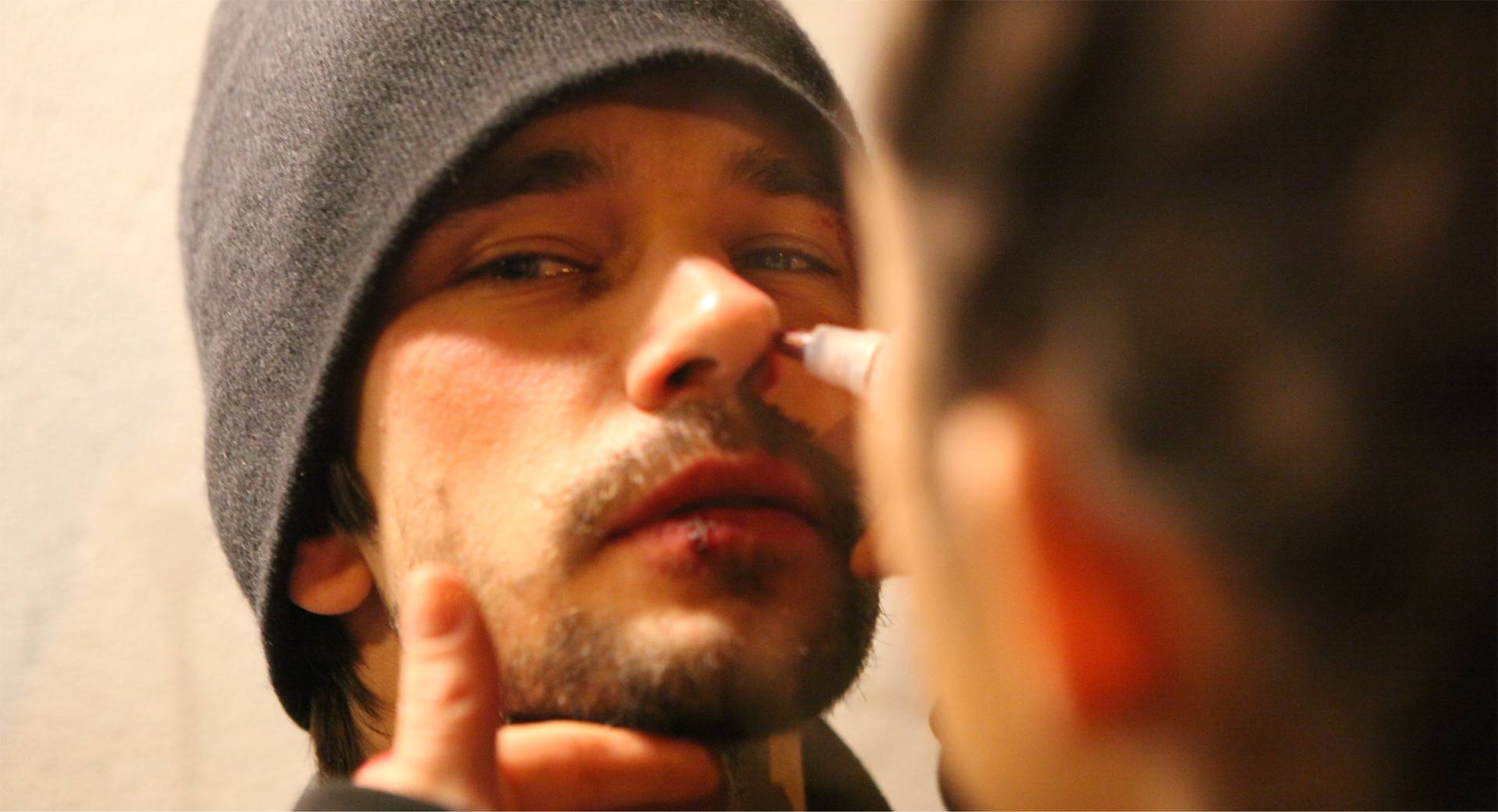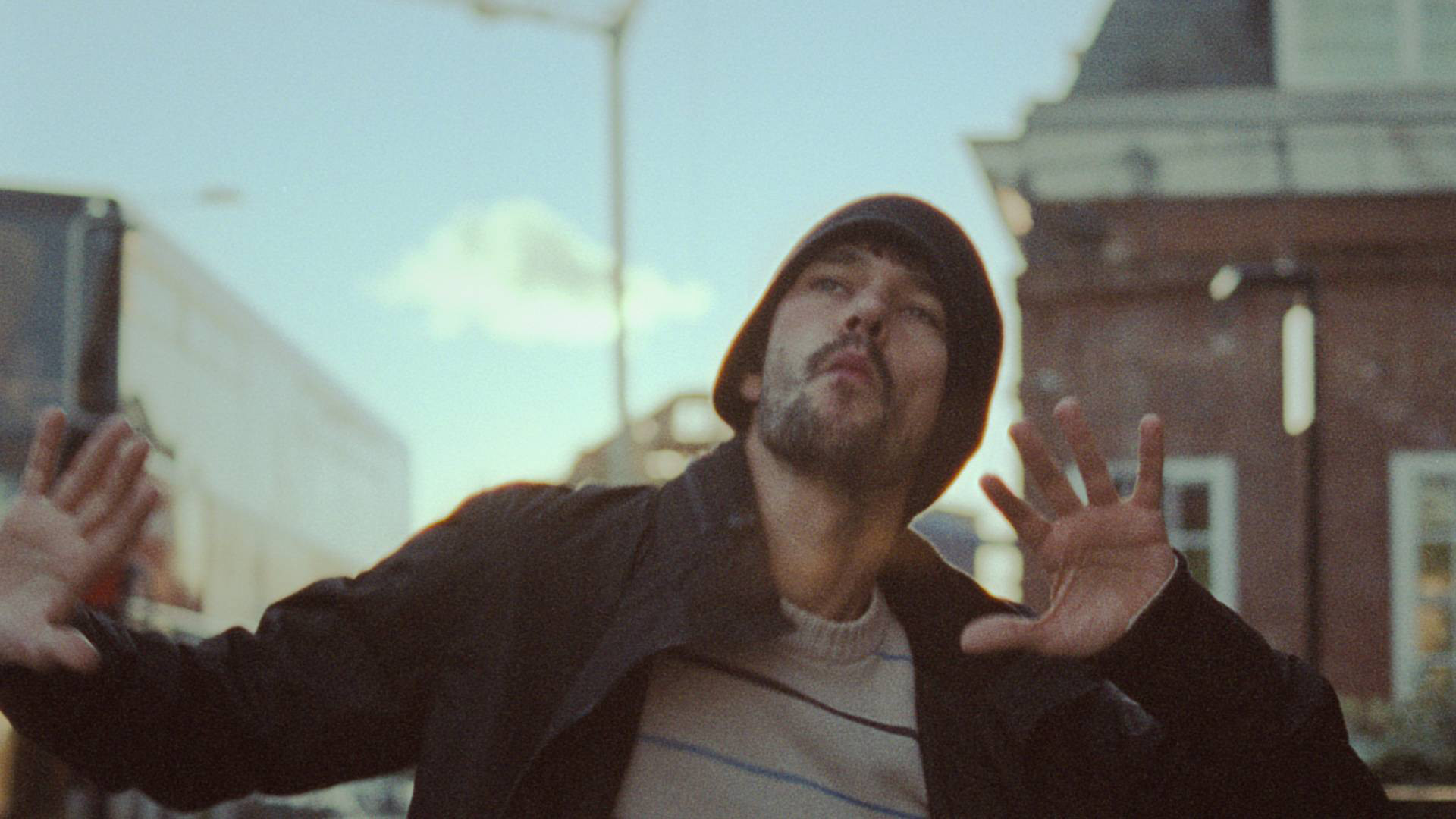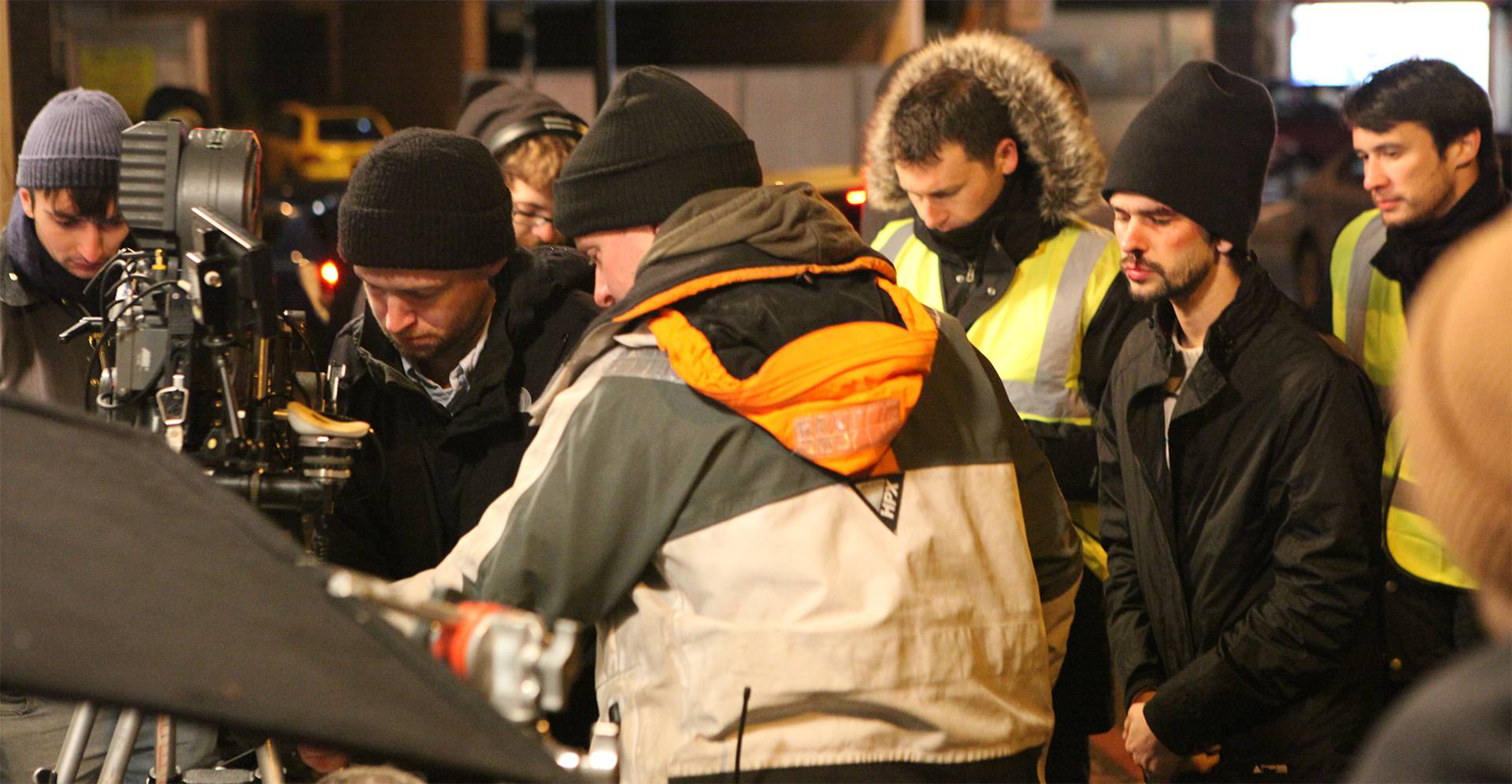In conjunction with the online release of what I believe to be one of the most striking and memorable short films of recent times, Aneil Karia’s BEAT, we invited the filmmaker to talk to Short of the Week about working with Ben Whishaw, shooting in 16mm and creating an impactful and cinematic experience:
The thing I really love about the narrative for BEAT is on its surface it seems like such a simple premise, but I can’t even begin to comprehend where the vision for such a distinct storytelling approach came from. How did the story originate?
The film was inspired by a desire to explore a number of themes, rather than tell a “story” in the word’s more traditional sense. I suppose that’s how ideas first form in my head as a rule: from characters or perhaps just a ‘feeling’ I want to explore. The plot comes later. A big theme I wanted to probe in BEAT was the experience of living in a big, heaving city like London, and about how there are some days where that city feels like the most vibrant, beautiful place on earth – and you feel this warmth towards the other inhabitants of that city and have this sensation/delusion that you all share some kind of unspoken camaraderie. And then on another day, it can feel like this filthy, suffocating mass bearing down upon you – that the strangers around you are just that – and that you just want to get out of there ASAP. “Which” London you experience is obviously to do with a fine balance of many factors and can turn on a dime.
“I wanted to look at something called intrusive thoughts – those strange urges we all get to do something that doesn’t conform to the norm”
Another theme is our instinctive responses to ‘abnormal behaviour’. Inevitably, day to day, we encounter people behaving in a way we’re not comfortable with – shouting to themselves or at nobody in particular – moving in an erratic fashion. We are quick to label these people as a “nutcase” or a “lunatic” – we keep our heads down as we pass them, we might even cross the road if they feel particularly threatening – basically as rule, we’ll spend as little time in their environment as possible. This film forces the viewer to spend an elongated period of time in their company and go beyond that impulsive response of “oh look, a maniac”. Finally, I wanted to look at something called intrusive thoughts – those strange urges we all get to do something that doesn’t conform to the norm. Whether it be licking your boss’s face during a meeting, or stepping onto the tube tracks – despite having no desire whatsoever to get fired or die respectively. It’s ambiguous in BEAT whether this man is behaving like this because of some mental instability, or whether he has made a conscious decision to tear up the social contract we all adhere to and is in fact, in total control.

Was the original idea for the film similar to what we see now or did the story evolve throughout production?
Actually the film stayed very true to the original idea. Of course, Ben Whishaw, Stuart Bentley – the DoP, Amanda James – the editor, Scott O’Donnell – the producer – and the entire cast and crew brought so much to it and escalated it to levels beyond the idea. But in terms of what happened in the film, it was pretty much set out that way in the treatment document (we didn’t have a traditional script). I’m not one of those directors with a little notepad containing 30 or 40 ideas for films. It takes a while for an idea I really believe in to crystallise in my mind – but once it does, I can see it very clearly. That doesn’t happen on a weekly basis unfortunately, but it happened with BEAT.
“I wanted to hold people’s attention for the whole thing and leave them feeling like a bus had hit them”
I remember first seeing BEAT at the Encounters Short Film Festival and feeling after viewing it that I’d been punched in the gut. It feels like such a raw and visceral film, how were you hoping an audience would react to it?
My hope for how the audience would react was pretty much word for word what you just said! I feel like I probably used those very words when talking about the feeling we wanted to inspire while making it. I didn’t want to bleak people out with this film – I wanted to hold people’s attention for the whole thing and leave them feeling like a bus had hit them i suppose. Actually i suppose a bus hitting you would be quite bleak, but you know what I mean. I wanted it to be an exhilarating and yes – certainly visceral – viewing experience. All of my favourite films have a very strong mood which hangs over the film but also stays with you after you’ve watched it. That’s what I’d like to do with all my films and what I hope BEAT achieved to an extent.
Shooting on 16mm seems a really inspired production decision as it really adds to the gritty, realistic feel of the piece – did you always plan to shoot it this way and what do you think the format adds to the look and feel of BEAT?
The aim with the film was to bring to life the city’s less-seen and less-polished parts; it’s a raw and unvarnished world we’re painting but still one with a lot of beauty within that and 16mm felt like the perfect format for this. The texture seemed spot-on for everything – the streets, the character, his state of mind… I’ve always been a big fan of 16mm and so is Stuart, the DoP – so it was a pretty straightforward decision. We just had to do some sums about whether it was workable with the limited budget. Luckily Fujifilm and Technicolor really helped us out there.

At the heart of the film is a powerful performance from Ben Whishaw – how did you get Ben involved and what do you think he brings to the film?
I’d met Ben briefly a few times through a mutual friend who studied at RADA with him. I sent over an email with the treatment attached and basically said, if you’re into with the idea and can find a couple of days in your schedule over the next few months then we’d love to make this with you. Luckily he was a fan of the idea and happened to have a couple of days free two weeks from sending that email! So the production had to come together pretty lightning-fast. But I don’t think that was such a bad thing – undoubtedly a bit of a headache for Scott but there was also less time for me to overthink things – one of my favourite hobbies! In terms of what Ben brought to it. Well, not to get too sycophantic, but he brought everything to it. The film is the character really and Ben took that character to such a complex, intense, extremely-watchable place. He totally embraced the instinctive way we wanted to shoot – he became the guy for a couple of days basically. I don’t mean he was snarling at everyone and chucking his chips around during the lunch breaks but he got into that headspace and lived in it completely.
“Sound played just as important a role as the camera in bringing to life the inner chaos and disorientation”
The film is sparse in terms of dialogue, how much of an important role did music and sound play when it came to the post-production?
A hugely important role. It was key that the music and the sound of his world were not separate entities, but rather one and of the same. Gunnar Oskarsson the sound designer, did an incredible job of this. Sound played just as important a role as the camera in bringing to life the inner chaos and disorientation he (and us hopefully) start to experience. I spoke earlier about those days you find the city suffocating – well that suffocation is multisensory and I definitely wanted the sound design to play into that.

At times the film feels both choreographed and improvised – how much of the action was predetermined and how much was impromptu when filming?
As for Ben’s movement, we spent half a day in a rehearsal studio in Kings Cross ahead of filming – me, him and a choreographer. Rather than trying to come up with specific ‘moves’ we just explored how this character might use his body. We didn’t really try to pin anything down as it was all supposed to be rawer than that. But what was really useful was that we came up with a scale reflecting the intensity of his movement, where 1 represented an almost ‘normal’ walk, with these almost subliminal twitches rippling under the surface and 10 represented a full-on limb-explosion. On the shooting days, we could then experiment with incrementally building the intensity – say 3, 4, 5 – and then more violent spikes – say 2 to 8 or whatever. But really, when we shot – Ben was just (for want of a less pretentious phrase) “feeling it”. We actually spoke about the idea of having a sound torch with us and blasting out music while filming, but in the end decided against it. The idea was that the movement should come from a deeper, more personal place. (Wow, hard not to sound wanky with this question!). In terms of the other characters, it was a mix of cast actors and passers by, but the hope was that they would all feel like ‘real’ people. The idea with this film was to strive for absolute authenticity. So we shot a lot of the film using long lenses, with the camera hidden so that people would react to Ben in as genuine a way as possible.

The film has made a huge impact on the festival circuit, how has that experience been and why have you decided to release the film online now?
We were over the moon with the festival run, particularly in Europe. Knowing how many shorts are out there, it’s a great feeling when a respected festival with slots for only X number of films chooses yours to be part of their programme. For various reasons I wasn’t able to actually be at many of the festivals, but I did make it along to the premiere at Edinburgh and it was a tremendous buzz sat amongst a couple of hundred people, trying to gauge the reaction. But no matter how good the festival run, one can’t deny that the festival world is a very ‘industry’ heavy place and when so many people have put so much into making a film, you want it to be seen by a wider audience than that. We have a feature film in development with Ben attached, so now is as good a time as any to get BEAT out there – I’m excited to see the reaction!
Do you think experiencing the film online will be any different from experiencing in a theatrical environment?
Of course, when so much care and attention has gone into the technical craft behind a film, it’s a real joy to see that come alive on a big screen with Dolby or surround sound or whatever. And us filmmakers are a precious sort I guess, so sometimes the idea that somebody might watch this on a 3 inch screen with phone speakers is a little alarming initially! But actually, this is just another way that people consume things now – myself included – and if the film is strong enough I hope it’ll stand up to being played on whatever – television, tablet – the lot. Having short films online means an infinite number of people can see them – and thanks to the passion and excellent (if i can say this now we’re on it?!) curation from people like SoTW and Vimeo, it’s easier than ever to find strong, exciting and fresh material.
“I’d love to make another short before the year’s out – I have a couple of ideas that I’m itching to bring to life”
What are you working on next?
My main focus at the moment is my first feature film, SURGE. It will star Ben Whishaw and is currently in development with Creative England and the incredible Rooks Nest Entertainment (who made Obvious Child, My Brother The Devil and the forthcoming – and amazing – The Witch). The film will have some tonal similarities to BEAT in its feel and mood but is a very different beast. It focuses on the surprising – often bizarre – reality of bank robberies, a huge number of which are committed by people with absolutely no criminal history or experience whatsoever; lonely, disillusioned men who are not driven by money necessarily but just the need to feel ‘more’. Ben will play a quiet, law-abiding hospital porter who one day decides to abandon his orderly existence and start acting on his inner desires, whatever those might be. Around the development of this (with the writer Rupert Jones) I am working on various other projects. At the moment I’m directing a Sky Arts documentary with Illuminations Media about Ai Weiwei and his upcoming RA exhibition. And I’d love to make another short before the year’s out – I have a couple of ideas that I’m itching to bring to life.
 Rob Munday
Rob Munday